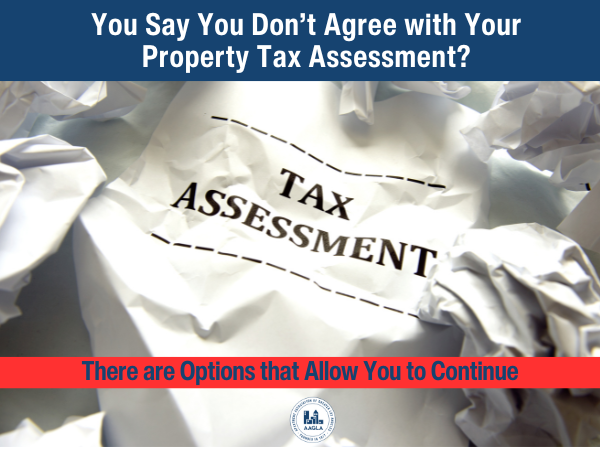You Say You Don’t Agree with Your Property Tax Assessment? There are Options that Allow You to Cont
You Say You Don’t Agree with Your Property Tax Assessment?
There are Options that Allow You to Contest It!
By Susan Orloff and Gina Rodriquez, Ryan, LLC

The potential impact on profitability makes it imperative that you manage and mitigate your property tax liability. California taxpayers’ property taxes are based on the property’s assessed value as determined annually by the county assessor. Under California law, and specifically 1978’s Proposition 13, a property’s assessed value generally is established when the property changes ownership or when it is newly constructed.
The pandemic and rise in interest rates put the real estate market and values in flux. Some assessors are being proactive and decreasing assessed values when warranted. Property owners who disagree with the assessed value that the assessor establishes for a property should first discuss the issue with the county assessor’s staff in the county where the property is located. If an agreement cannot be reached, then property owners have a right to appeal the value under certain circumstances. (Note: In most cases, a property owner should be facing a minimum of 5%-10% fair market value below current assessed value to make an appeal worthwhile.)
In all counties in California, either one or more assessment appeals boards (AABs) or a county board of supervisors performs the duties of a local board of equalization, commonly referred to as an appeals board. In Los Angeles County, there are multiple AABs, which are independent entities. Their function is to resolve disputes between the county assessor and property owners over values (and sometimes legal issues) of locally assessed property like apartment buildings, office buildings, residential property, business personal property, etc. The decisions of an appeals board are legally binding and enforceable.
There are two ways to contest the assessed value of your real property (secured) and business personal property (unsecured) tax bills. (Caution: Property owners must pay assessed property taxes on time — even if they have filed an appeal. Failure to do so will result in interest and penalties being charged, regardless of the outcome of the appeal.)
Request a Review with the Assessor
To contest a property’s assessed value shown on the annual tax bill, property owners may request an informal review within the assessor’s office. Property owners may need to preserve their right to formally appeal by filing an appeal application with the appeals board during the open filing period beginning on July 2nd and ending on November 30th in most counties, including Los Angeles County (otherwise, by September 15th) of the year in question. (Note: November 30, 2024, falls on a Saturday, so the deadline is December 2, 2024.) The filing of an assessment appeal application is separate from the informal review an assessor may undertake at your request. However, property owners may file an appeal at the same time of the informal review.
An Appeal with the Assessment Appeals Board (AAB)
To preserve formal appeal rights, property owners must file an appeal application with the AAB. There is a $46 nonrefundable fee to file an appeal application in Los Angeles County (there are fee waivers for financial hardships). Property owners have a choice to present their case to an AAB or an Assessment Appeals Hearing Officer. The Assessment Appeals Hearing Officer Program offers an expedited and less formal appeals hearing, and they are offered in a virtual setting. However, only multifamily dwellings of four units or less, any property valued at $5 million or less, cooperatives, condominiums, and single-family dwellings qualify for this program.
To file an appeal online, visit the AAB’s website at https://bos.lacounty.gov/services/assessment-appeals/. Once your application is processed, the property owner will be notified of the upcoming appeal hearing.
Declines-in-Value
California’s Proposition 13, approved by voters in 1978, decreased property taxes by assessing values at their 1976 value and restricted annual increases of assessed value to an inflation factor, not to exceed 2% per year. These rules apply equally to all real estate, residential and commercial—whether owned by individuals or business entities. Also In 1978, California voters passed Proposition 8, which allows a temporary reduction in assessed value when a property suffers a “decline-in-value.” A decline-in-value occurs when the current market value of your property is less than the current assessed value as of January 1 of a given year.
While Proposition 8 allows property owners to enjoy substantial property tax savings during a real estate downturn, once property values begin to rise, the assessed value can increase more than the 2% cap in any given year.
The authors, Susan Orloff and Gina Rodriquez, are Principals at Ryan, LLC. Ryan, LLC provides federal, state, local, and international tax services. As the largest property tax practice in North America, Ryan’s experts can assist with property tax compliance and assessment appeals. If your property has an assessed value of more than $10 million, and you believe it is being over assessed, please contact Ryan, LLC at https://ryan.com/. For more information, contact Susan Orloff, Principal, at (818) 543-4760, or Gina Rodriquez, Principal, at (279) 600-3261.
